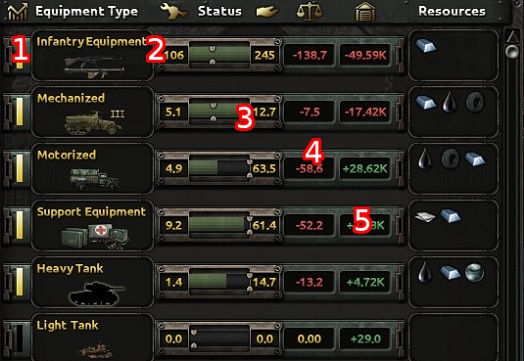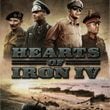Logistics
Last update:
All production relies on effective distribution. Some of the produced gear will be stored in storages, depending on your current demand. As for the rest, it will be allotted to modernization of units or to replenishments.
Icon | Name | Note |
| Reinforcement | Each time armies fight in a conflict, or you change a template, each existing division has to receive gear for replenishments. OF course, in the case of changing the template, this matters when you add battalions to a division. If you are reducing them, you automatically receive a larger number of conscripts and the unused gear gets stored. |
| Stockpile | Gear you create is stored, after it satisfies current your needs. Thanks to this, whenever you want to deploy a division that will use the gear, they will receive that gear. Sometimes, it is a good idea to store some of the basic gear, such as rifles, thanks to which you can speed up the deployment of additional units, when this becomes necessary. |
| Upgrade | If, using templates, you do not increase the number of divisions, but you have developed better tanks or vehicles and you want to use them, your production will be transferred for the needs of modernization. Of course, if you want to produce new units, you can set the priority for replenishments and modernization will be postponed. |
Check the condition of produced gear using the logistics panel. At first, it may seem a bit complicated, buy it is very helpful, in fact.

The above screenshot presents individual elements of the logistics panel. All of the elements have been explained below. Remember to access logistics panel often. This will help you use the remains of obsolete gear and prevents its overproduction.
1. Production capacity
This is the same modifier as in the case of the production panel. Using the yellow progression bar, you can determine at first glance, whether all assembly lines have been opened for long enough to attain maximum capacity. This piece of information is very important from the viewpoint of management of factory capacity. If a line does not work for a longer period of time, it is difficult to determine whether you need more factories within a line. Make sure that this bar is filled up, before you reorganize.
2. Production
This element specifies how many units of a product are produced daily. Values provided by the production panel vary, which makes it more difficult to determine what quantities will be available for the army, throughout the day. Daily assessment is especially important when you plan an invasion, when you deploy your armies in their positions, but you have to wait for replenishment of supplies.
3. Gear distribution
This value specifies how many applications for supplies are being realized daily. This is especially important, because this lets you determine the condition of infrastructure in your country. If you have several assembly lines for a single product, and you have high production capacity, and gear distribution exceeds the determined value, this means that transport of goods between provinces is good.
4. Balance
Of course, wherever there is a positive value and loss of supplies, there you also need the final balance. Basing on this, you can determine after what time realization of applications will drop, or when production limit exceeds demand.
5. Storage condition
The panel's key element. Thanks to it, you can determine whether the gear you produce is received by the units, or whether you have already produced enough gear for it to be stored. This value is helpful while organizing production and, apart from that, this is the only place where you can look up whether you will have to wait for rifles, while deploying an army 10 thousand strong, or whether you will only have to wait until your conscripts are trained.
You are not permitted to copy any image, text or info from this page. This site is not associated with and/or endorsed by the Paradox Interactive or Paradox Development Studio. All logos and images are copyrighted by their respective owners.
Copyright © 2000 - 2025 Webedia Polska SA for gamepressure.com, unofficial game guides, walkthroughs, secrets, game tips, maps & strategies for top games.



